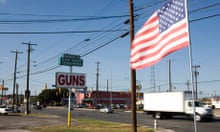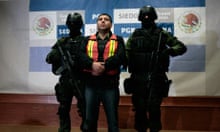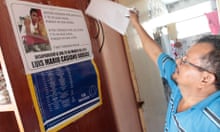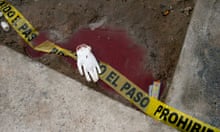If anyone at Academy sports shop in Houston was suspicious as John Hernandez pushed $2,600 in cash across the counter, they kept it to themselves.
The 25 year-old unemployed machinist in dark glasses walked out of the gun shop clutching three powerful assault rifles modelled on the US army's M-16.
A few weeks later, Hernandez bought five similar weapons at another Houston gun shop, Carter's Country. There were few questions on that occasion, either, or as he visited other weapons stores across the city in the following months until he had bought a total of 14 assault rifles and nine other weapons for nearly $25,000.
With each purchase, all the law required was that Hernandez prove he lived in Texas and wait a few minutes while the store checked he had no criminal record.
Months later, one of those assault rifles was seized in neighbouring Mexico at the scene of the "Acapulco police massacre", after one of the country's most powerful drug cartels killed five officers and two secretaries in an attack at the beach resort once regarded as a millionaires' playground. Another was recovered after the kidnap and murder of a cattle buyer. Others were found in the hands of top-level enforcers for narcotics traffickers, or abandoned after attacks on Mexican police and the military. The guns have been tied to eight killings in Mexico.
In time, US federal agents discovered that Hernandez was at the heart of a ring of two dozen people who bought more than 300 weapons from Texas gun shops for one of the more notorious Mexican drug cartels, Los Zetas. Some of those guns have since been linked to the killings of at least 18 Mexican police officers and civilians, including members of the judiciary and a businessman who was abducted and murdered.
The weapons bought by Hernandez and his ring were just a fraction of the tens of thousands smuggled across the US's southern border to cartels fighting a bloody war with the Mexican government that has claimed about 45,000 lives in five years.
It's a war sustained by a merry-go-round. The cartels use the money paid by Americans for drugs to buy weapons at US guns stores, which are then shipped across the frontier, often using the same vehicles and routes used to smuggle more narcotics north. The weapons are used by the cartels to protect narcotics production in their battle with the Mexican police and army, and smuggle drugs north.
Key to the cycle is the ease with which traffickers are able to obtain guns in the US, made possible in large part by the robust opposition of the powerful gun lobby – backed by much of the US Congress – to tighter laws against arms trafficking.
"The United States is the easiest and the cheapest place for drug traffickers to get their firearms, and as long as we are the easiest and cheapest place for the cartels to get their firearms there'll continue to be gun trafficking," said J Dewey Webb, the special agent in charge of pursuing weapons traffickers in Texas at the US Bureau of Alcohol, Tobacco, Firearms and Explosives (ATF).
Kristen Rand, director of the Violence Policy Centre which campaigns for greater gun control, said drug traffickers face little more than a few logistical difficulties in buying weapons in America.
"If you wanted to design a set of laws to encourage gun trafficking, that is what the US has done," she said. "The traffickers are able to access a high volume of assault weapons, sniper rifles, armour-piercing handguns. All the weapons they need to wage war are readily available on the civilian market. There's basically nothing to stop them other than the annoyance of having to round up enough people to buy them."
'All the weapons are bought in the US'
It's even easier to buy ammunition. While many US states demand a driving licence to buy common types of cold medicine that can also be used to manufacture the drug meth amphetamine, not a single state requires identification to purchase ammunition, even in large quantities.
According to the US Government Accountability Office, 87% of firearms seized by Mexico over the previous five years were traced to the US. Texas was the single largest source. The US attorney general, Eric Holder, told Congress last month that of 94,000 weapons captured from drug traffickers by the Mexican authorities, over 64,000 originated in the US.
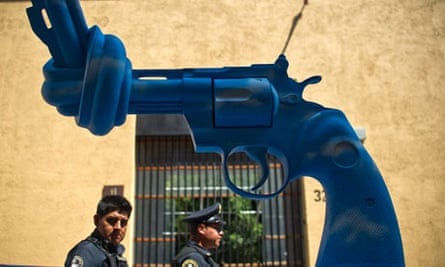
One of the most senior members of the Zetas, Jesus Enrique Rejon Aguilar, said after his capture in July that the cartel is armed by weapons from American gun shops.
"All the weapons are bought in the United States," he said in a video recorded by the Mexican federal police.
Only legal residents of Texas can buy guns over the counter, so the cartels use people such as Hernandez, who has since been jailed for eight years along with other members of his ring, as "straw purchasers".
"We see them being paid $50 to $500 a time. In these times, that's a lot of money for folks," said Webb. "What we've seen with the cartels is very elaborate schemes. They have people that handle the money. They have people that handle the transportation of the weapons. They use the same infrastructure they use to bring the drugs in. Sometimes even the same vehicles that move the narcotics north are the vehicles that move the firearms and the ammunition and money south."
The straw buyers are mostly in search of guns such as AK-47s and Armalite assault rifles, which were popular with the IRA, as well as powerful pistols such as the Belgian-made FN. All are available over the counter in thousands of gun shops.
Webb rests his hand on a long, heavy sniper rifle that fires a round nearly six inches long, seized on its way to Mexico.
"The cartels want that because it fires a round that can disable a vehicle by penetrating the engine. You can hit a target from almost a mile away with that. That gun sells for about $10,000 most places. Over the last five years we've seen an increase in demand by the traffickers for that gun," he said.
"We had a case not too long ago where a juvenile, through his iPhone, was able to buy one of those weapons from a licensed dealer and then sent an adult in to straw-purchase the gun."
Jim Pruett's gun store in northern Houston sells the full array of weapons. "We've been through hurricanes here, many of them, where lawlessness prevails for a short period of time. If something like that hits, you're gonna have to defend yourself," said Pruett, standing next to a gun target that characterises Osama bin Laden as a zombie. "I think the zombies are real in that they are the meth addicts, the crazed cartel druggies."
Pruett said he sees suspicious buyers on a regular basis. He still sells them guns but then reports them.
"Is there racial profiling? Yes. If they're Hispanic and they're female and they're buying 10 AK-47s, yes, that's a red light and we're gonna call ATF and let them know about it," he said.
Has he had such a customer?
"Yes. We unofficially found out she was taking the guns south and turning AK's in to fully automatic," he said. "Gun store owners are patriotic. We want to get the bad guys."
Pruett said he also turned in a man who bought 10 AR-15s, the civilian version of the army's M-16.
Last month, Holder told Congress that the US is "losing the battle" to stem the flow of weapons, and appealed for stronger legislation. Last year, Mexico's president, Felipe Calderon, pleaded with the US Congress to act.
"There is one issue where Mexico needs your cooperation, and that is stopping the flow of assault weapons and other deadly arms across the border," he said.
In July, two Democratic party members of Congress sponsored legislation to make weapons trafficking a federal crime. It has widespread support among police officers including the Federal Law Enforcement Officers Association which represents more than 26,000 federal agents.
'Virtually moribund' Congress
But the bill is facing stiff resistance from a gun lobby that says new laws are the thin end of a wedge that will result in the government confiscating all weapons. Wayne LaPierre, chief executive of the National Rifle Association, one of the most powerful lobby groups in the US, has said that tightening gun laws will penalise hunters and those Americans who buy firearms for self-defence.
Many members of Congress, often with one eye on the NRA, are also resistant.
Politicians who speak alarmingly of the threat to the US from the bloodshed on its southern border, and use it to call for tighter immigration controls, are often the ones who most strongly oppose even the most minimal new measures to stem the flow of weapons.
A report by the US senate's narcotics control caucus in June said: "Congress has been virtually moribund while powerful Mexican drug trafficking organisations continue to gain unfettered access to military-style firearms coming from the United States".
"The reason it doesn't happen is because the National Rifle Association owns Congress," said Rand. "Congress is right now working to pass legislation to loosen the restrictions on the carrying of concealed weapons. There's no will, no leadership from the White House."
The Obama administration has spurned appeals to reinstate a ban on the importation of AK-47s and other kinds of foreign-made assault rifles that was in place during the Clinton administration but dropped by President Bush.
The ATF, which falls under Holder's jurisdiction, earlier this year began requiring gun shops in the four US states bordering Mexico to report to authorities if the same person buys two or more assault rifles and some other guns over a five-day period. Congress has tried to block the measure, to Holder's frustration.
"Unfortunately, earlier this year, the House of Representatives actually voted to keep law enforcement in the dark when individuals purchase multiple semi-automatic rifles and shotguns in south-west border gun shops," Holder told Congress.
The gun lobby's strategy has been to go on the attack by questioning whether the cartels are being armed by guns bought in the US at all. It's a view shared by Pruett.
"The idea that Jim Pruett's guns and ammo are supplying the drug cartels with weapons is totally unsound thinking," said Pruett. "The drug cartels probably have more money than Mexico. They get AR-15s, rocket launchers, explosives, you name it, by the cargo container full, probably through legal means. Probably El Salvador is more of a sieve for the influx of guns than the United States is … The argument ends with: the United States does not supply the cartels with weapons."
Webb scoffs at the idea. Although restrained by his position from openly criticising the politics of the issue, he is clearly frustrated at the unwillingness of Congress to act.
"There's some common sense things about the way things should be done," he said.
But ultimately, Webb says it's the drug buyers who are responsible.
"Every person that pays for that marijuana, that meth, that cocaine is paying for the tools of the trade which are guns. Those people that are buying the drugs are just as responsible as the people buying those guns, just as responsible as the people pulling the triggers in Mexico. The drug use in this country is fuelling that machine. It's a never-ending cycle," he said.
Mexico's president sees it differently.
"Why does this arms business continue?" Calderon said in June. "I say it openly: it's because of the profit which the US arms industry makes."
